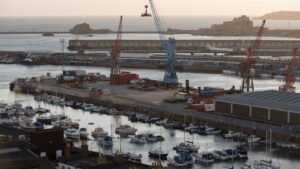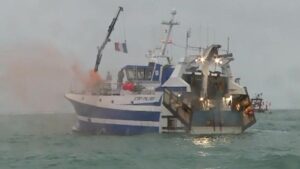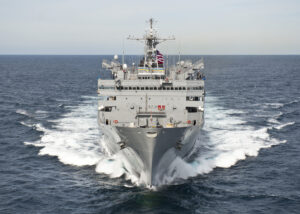Emmanuel Macron has sent a military boat racing at full speed towards Jersey for a stand-off with the Royal Navy as 100 French fishing vessels blockade the harbour.
Athos was hurtling towards the British Crown dependency to confront HMS Severn and HMS Tamar – despite them being far superior in size and power – as they monitor the protest over post-Brexit fishing rights.
The British boats are armed with cannon and machine guns and are roaming the Channel after Paris warned yesterday it could cut off electricity to the island – which is largely supplied via an undersea cable.
Boris Johnson is understood to have decided to deploy the huge patrol boats after intelligence revealed the 100 fishing boats would block access to the port at Saint Helier.
The sabre-rattling Prime Minister will keep his eye on events in the Channel throughout today as voters take to the polling booths in the local elections.
It comes after French maritime minister Annick Girardin yesterday accused the Channel Island of dragging its feet over issuing new licences to French fishing boats.
She said France was ready to take ‘retaliatory measures’ – suggesting it could cut its power, with 95 per cent of its electricity coming from France.
David Sellam, the head of the Normandy-Brittany sea authority, added he believes Jersey has been taken over by an ‘extremist fringe who want to reduce French fishing access and profit from Brexit’.

![]()
![]() Witnesses on the ground counted 100 small vessels on the choppy water this morning, with French fishermen setting off flares and hoisting banners calling for access to the waters.
Witnesses on the ground counted 100 small vessels on the choppy water this morning, with French fishermen setting off flares and hoisting banners calling for access to the waters.
Jersey fisherman Josh Dearing was astonished by the scenes on the sleepy island, describing the port this morning as ‘like an invasion’.
The blockade evokes memories of the Cod Wars which took place in the North Atlantic during the 1970s, when at times the Royal Navy stopped Icelandic boats from interfering with British trawlers.
The row is the result of Jersey implementing new requirements under the terms of the UK-EU trade deal for boats to submit evidence of their past fishing activities in order to receive a licence to carry on operating in its waters.
Maritime tracking websites this morning showed HMS Severn had arrived in Jersey ‘to conduct maritime security patrols’.
It is an older Batch 1 patrol vessel equipped with 20mm cannons and 7.62mm machine guns.
HMS Tamar, a Batch 2 vessel with a 30mm MK44 Bushmaster cannon, has also arrived and was spotted looming over the tiny French vessels.
Around 100 French boats were in the harbour this morning, with some crews setting off flares during the so far peaceful protest.
The leader of the demonstration had asked the French boats to leave the harbour to let a freight ferry – the Commodore Goodwill – depart.
Jersey fisherman Josh Dearing described the scene at the port of St Helier on Thursday morning as ‘like an invasion’.
The 28-year-old said: ‘There were a few hand-held flares and smoke flares going off and apparently a few maybe bangers and stuff going off from the French.’
He said the French fleet was mostly made up of ‘big French dredgers and trawlers’ of about 12 metres or more.
He added: ‘It was quite a sight. It was impressive, I looked from the shore this morning and it was just like a sea of red lights and flares already going off at sea. It was like an invasion.’
He said there had been rumblings about a planned protest a few days ago but he had not been sure if it was ‘serious or empty threats’.

He added: ‘The French being the French, they don’t mess around. They can blockade their own harbours – they wouldn’t think twice about coming and doing it to us.’
Meanwhile French fishermen on tiny vessels said they were ready to restage the Battle of Trafalgar as they headed towards the Royal Navy ships.
Jean-Claude La Vaullée, skipper of Le Cach, said: ‘I’ve refuelled the boat – we’re ready to restage the Battle of Trafalgar.’
The furious fisherman, who has been working off Jersey for more than 40 years, said he had now been given the right to ’11 hours fishing a year’ in the area.
The Battle of Trafalgar of 1805 was in fact a massive defeat for the French and Spanish fleets, as Admiral Lord Nelson led the Royal Navy to a historic victory.
Romain Davodet, another French fisherman, said they had been told the Jersey decision ‘were irreversible’ and around 250 vessels faced disaster, along with ‘more than 2,000 jobs ashore.’
Another, Théo Marais, added: ‘I’m having my first boat built.
‘I’m 24, it’s a Euro 825,000 boat that I’m not even sure I can launch it! We love our jobs.
We don’t want to live on aid, what we want is to work.’
The Ministry of Defence said: ‘HMS Severn and HMS Tamar are deploying to Jersey to conduct maritime security patrols. This is a strictly precautionary measure and has been agreed with the Jersey Government.’
Mr Johnson ‘stressed the urgent need for a de-escalation in tensions and for dialogue between Jersey and France on fishing access’ in talks with Chief Minister of Jersey John Le Fondre and the island’s minister of external affairs Ian Gorst.
A Downing Street spokesman said: ‘The Prime Minister underlined his unwavering support for Jersey. He said that any blockade would be completely unjustified.
‘As a precautionary measure the UK will be sending two offshore patrol vessels to monitor the situation. They agreed the UK and Jersey governments would continue to work closely on this issue.’
Labour’s Shadow Defence Secretary John Healey MP said: ‘The threats on Jersey are completely unreasonable. The Navy’s experience in sensitive situations will help reassure residents and protect Britain’s broader national interests.
‘The British government must now get round the table with French colleagues and authorities in Jersey and sort this issue out.’
But Colonel Richard Kemp, former commander of British troops in Afghanistan, said there is not much the Royal Navy vessels can do.
He told TalkRadio: ‘It’s something that should be dealt with by… not with direct action like this. I always find negotiations by diplomacy rather than by gunboats as you call them.
‘There’s not really much in my view that a couple of patrol vessels are going to be able to do if a significant number of French fishing vessels decide to actually blockade the port.’
Rear Admiral Chris Parry added the Royal Navy vessels were sent to ‘monitor the situation’ and to tell the French ‘this is getting out of hand’.
He told LBC: ‘I think what they’re going to try and do is reduce tensions and say we’ve noticed it’s got to a level where we’ve got to start talking seriously between civilised countries and let’s get back to the negotiating table.
‘If they don’t like something locally in Normandy or Brittany they always go and blockade something or somebody. I think they’re forgetting the Royal Navy is the group that’s really good at blockading people.’

He added: ‘I think early action by the Government in sending a couple of small warships will actually say to the French you’ve got our attention, we’re going to talk now, but let’s not be silly.’
Foreign Secretary Dominic Raab and Trade Minister Greg Hands also spoke to their French counterparts yesterday and raised concerns about the recent provocations.
Government sources said Environment Secretary George Eustice has repeatedly tried to set up a meeting with Mrs Girardin in the past 48 hours but the French minister has been unable or unwilling to attend.
Speaking yesterday, Mrs Girardin warned France was prepared to use ‘retaliatory measures’ outlined in the Brexit deal following the bitter row over fishing rights.
She added: ‘Regarding Jersey, I remind you of the delivery of electricity along underwater cables… even if it would be regrettable if we had to do it, we’ll do it if we have to.’
Stephanie Yon-Courtin, a French MEP and member of the EU Fisheries Committee, called on the people of Jersey and the UK Government to ‘understand that our fishermen need to carry on working’.
She told BBC Radio 4’s Today programme this morning: ‘This situation is all the more sad because historically Jersey and the French fisherman have always had very cordial and pretty good relations for the past decade.
‘Some of Jersey’s people need to understand, and Jersey’s government and UK Government, have to to understand that our fishermen need to carry on working.’
Asked if she supported the threat that power could be cut off to Jersey in the future, she added: ‘I’m just saying that at the last resort, if we don’t have any other means to be understood, then we will have to consider that. We don’t want to do that, I don’t think it’s good, I don’t think it’s good for anybody.’
Around 95 per cent of Jersey’s electricity supply comes via a £40million undersea electricity cable which was laid between the island and France in 2016.
Known as Normandie 1, the 16.7-mile cable took over a week to install and also provides power to Guernsey.
A senior Government source said Mrs Girardin’s comments were ‘surprising and disappointing, especially from a close neighbour’, adding: ‘This is just the latest example of the EU issuing threats as a first resort at any sign of difficulty.’
Don Thompson, president of Jersey Fishermen’s Association, said the ‘big question on everybody’s lips right now is ‘will our Government capitulate to that sort of tactic?’.
He told Good Morning Britain: ‘The French fishermen out there want conditions removed from their licences so that they can fish with no constraints in our waters, whilst our boats are subject to all sorts of conditions about how much they can catch, where they can go.’
He said it would be ‘grossly unfair’ if the Government does ‘capitulate to that’ and said such tactics might be used ‘again and again in the future’.
He added: ‘They’re not very happy fishermen down here this morning, suspecting that we probably will see our Government give in to that.’
Jersey’s foreign affairs minister Mr Gorst also vented fury at the threat, saying ‘it is not the first… that France has made’ over fisheries and warning the ‘confusing’ EU trade agreement had caused the feud.
Mr Gorst said that of the 41 boats which sought licences under the new post-Brexit rules last Friday, all but 17 had provided the evidence required.
He said the fishermen have simply failed to provide enough data about their historic fishing routes, and as soon as this data is provided the licences will be updated to allow them access.
Speaking to BBC Radio 4’s Today programme, Mr Gorst said: ‘We absolutely respect the historic rights of French fishermen to fish in Jersey waters as they have been doing for centuries.
But the trade deal – that Jersey didn’t negotiate, and nor did France – says that fishing vessels have to… provide all of the evidence of the amount of fishing they have actually done [in the last three years].
We can all see that this is not the first threat that the French have made, either to Jersey or the United Kingdom, since we’re into this new deal.
It would seem disproportionate to cut off electricity for the sake of needing to provide extra details so we can refine the licences. The trade deal is clear that when fishermen provide the evidence, we will provide the licences.’
Didier Leguelinel, from the Normandy fishing committee, last night told the reporters he could not stop the anticipated blockade, saying: ‘The general feeling is that we have been insulted by the Jersey Government.’
Simmering tensions between France the UK over rights to fish in the Channel suddenly boiled over last Friday when post-Brexit trading rules came into force around the island of Jersey.
The new rules mean any large French fishing vessels that want to enter the waters will need a licence provided by Jersey’s government.
But fishermen have complained the licences have been issued with conditions that they were previously unaware of and which had not previously been cleared with French authorities.
French regional officials spoke out about the issue at the weekend, before the French government got involved and ramped up the rhetoric on Wednesday.
Angered fishermen also began calling for a blockade of the island, and for their British counterparts to be banned from landing their catch at French ports.
At the moment, under the terms of the trade deal, French fishermen have to apply for their licence to their government, which then sends the application to Westminster, before it is passed on to Jersey.
In another sign of fraying tensions, it was revealed that Normandy will not reopen its honorary diplomatic premises in Jersey post-Covid – effectively cutting ties with the Channel Island.
Mr Gorst described the decision as ‘disappointing’ and added that ‘those historic ties are really important to us.’
He held talks with Marc Lefevre, the president of the La Manche region of northern France, yesterday on the ‘difficult set of issues relating to fishing licences’.
‘There are a number of important matters which we will continue to work through,’ he said.
Mr Gorst added the Jersey government is now seeking permission from London and Brussels to speak directly with the French fishermen concerned to resolve the issue.
Meanwhile, UK vaccines minister Nadhim Zahawi urged all sides to ‘work constructively’ to find a solution.
This is an issue for the [EU] commission to work with our team and all the indications from minister (David) Frost and his team is that the commission is taking seriously some of these operational challenges that we need to fix together,’ he said.
The French fisheries ministry asserts that London has effectively made new zoning rules for the waters – ‘where the ships can go and cannot go’, as well as the number of days the fishermen can spend at sea and with which machinery.
Paris claims London has made new demands while insisting that French fishing vessels carry data-tracking gear ‘which were not arranged or discussed, and which we were not notified about.’
Dimitri Rogoff, president of the regional fishing committee of Normandy in northern France, said that if French fishermen continued to be blocked from the waters off Jersey, there should be reprisal measures.
‘Fishermen from Jersey should not be able to land at Granville,’ he said, referring to the French port nearest the island.
French fishermen last month began a protest movement, blockading trucks bringing fish from Britain to France, over complaints that few of their vessels have obtained licences to operate in British waters.
France and Britain have increasingly clashed over fishing in recent weeks, with French fishermen saying they are being prevented from operating in British waters because of difficulties in obtaining licences.
The French fisheries ministry said Britain had introduced ‘new technical measures’ relating to licences for fishing off the Channel Islands which had not been properly declared to the European Union under the terms of the Brexit deal.
We consider that if the new demands for sea zoning or fishing equipment are integrated into the licences – when the European Commission has not been notified – they are null and void,’ the ministry said.
It added it was adhering ‘strictly to the deal’ agreed on fishing under the terms of Britain’s exit from the European Union on January 1.
‘If the United Kingdom wants to introduce new measures, it must notify the European Commission which in turn notifies us – that allows for us to engage in a dialogue,’ the ministry said.
‘These new technical measures are not applicable to our fishermen as things stand.’
Fishing proved one of the most fraught issues in the frantic negotiations leading up to Britain’s departure from the EU, with London tightly guarding control over its waters as a symbol of its sovereignty.
France said it had voiced its displeasure at the surprise measures with the European Commission.
Commission spokeswoman Vivian Loonela said the EU was engaged in ‘intense joint work’ with the British government to resolve the issue.’Any condition should be notified in a timely way to allow the other party sufficient time to comment or adapt,’ she said of the new British requirements.
‘In addition, any such conditions cannot be discriminatory towards our fishermen.’





